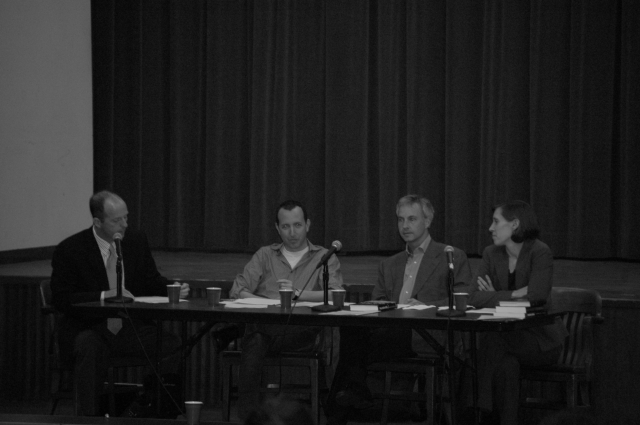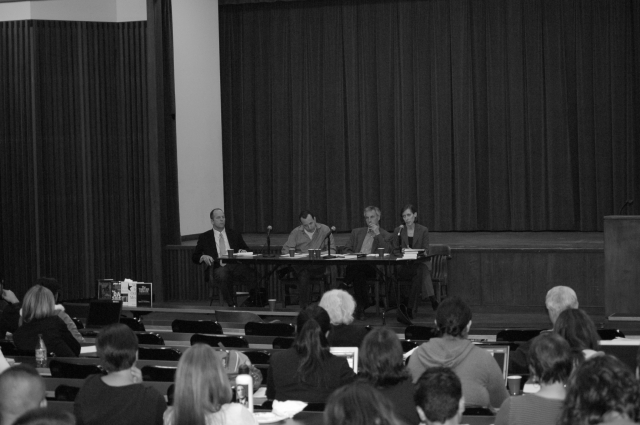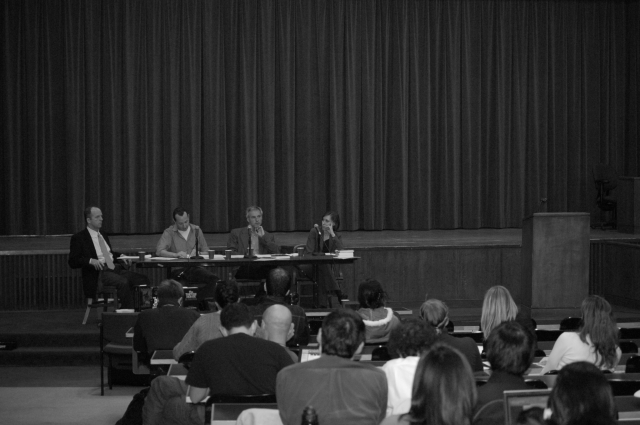From the Open-Publishing Calendar
From the Open-Publishing Newswire
Indybay Feature
NLG-Panel Discussion on the Legality of Torture, UC Berkeley, 10/28/08
The National Lawyers Guild at Berkeley Law School sponsored a panel discussion with Boalt professors and legal practitioners on the ethics and legality of torture.
Tuesday, October 28, 2008
The National Lawyers Guild at Berkeley Law School sponsored a panel discussion with Boalt professors and legal practitioners on the ethics and legality of torture. The audience of about 70 included activists, lawyers, professors, students, and members of the public. Boalt professor Oona Hathaway spoke first about the many international institutions that reflect a strong international norm against torture. Noting that these institutions tend to lack enforcement power, Hathaway argued that there is a special role for international public interest organizations to name and shame torturers, as well as for lawyers to bring domestic legal claims against torturers. Christopher Kutz, Professor of Law in the Jurisprudence & Social Policy Program at Boalt, next described what occurred in the United States after 9/11 that overcame the prevailing international norms against torture. He pointed to politicians’ willingness to innovate policy in light of a new public consensus that was unwilling to restrain torture. Kutz also focused on the role of government lawyers in the white house, justice department, and CIA in permitting policies of torture to develop in the US. Finally, ACLU staff attorney Ben Wizner discussed the public narratives that have emerged in defense of torture since 9/11, including the “ticking time bomb” trope (that desperate times call for desperate measures) and the “bad apples” trope (that only a few corrupt individuals are responsible for US torture). He pointed out that domestic lawsuits filed against torturers can be used to focus public attention back onto important issues such as the rule of law and human rights. Together, the panels presented a framework of how activists and lawyers can work together to call torturers to justice.
The National Lawyers Guild at Berkeley Law School sponsored a panel discussion with Boalt professors and legal practitioners on the ethics and legality of torture. The audience of about 70 included activists, lawyers, professors, students, and members of the public. Boalt professor Oona Hathaway spoke first about the many international institutions that reflect a strong international norm against torture. Noting that these institutions tend to lack enforcement power, Hathaway argued that there is a special role for international public interest organizations to name and shame torturers, as well as for lawyers to bring domestic legal claims against torturers. Christopher Kutz, Professor of Law in the Jurisprudence & Social Policy Program at Boalt, next described what occurred in the United States after 9/11 that overcame the prevailing international norms against torture. He pointed to politicians’ willingness to innovate policy in light of a new public consensus that was unwilling to restrain torture. Kutz also focused on the role of government lawyers in the white house, justice department, and CIA in permitting policies of torture to develop in the US. Finally, ACLU staff attorney Ben Wizner discussed the public narratives that have emerged in defense of torture since 9/11, including the “ticking time bomb” trope (that desperate times call for desperate measures) and the “bad apples” trope (that only a few corrupt individuals are responsible for US torture). He pointed out that domestic lawsuits filed against torturers can be used to focus public attention back onto important issues such as the rule of law and human rights. Together, the panels presented a framework of how activists and lawyers can work together to call torturers to justice.
Add Your Comments
We are 100% volunteer and depend on your participation to sustain our efforts!
Get Involved
If you'd like to help with maintaining or developing the website, contact us.
Publish
Publish your stories and upcoming events on Indybay.
Topics
More
Search Indybay's Archives
Advanced Search
►
▼
IMC Network





